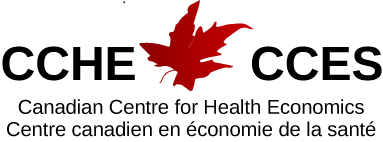
CCHE Seminar: Lady Bolongaita, University of Toronto
Nursing Labour Supply
As part of the Canadian Centre for Health Economics (CCHE) Friday Health Economics Series, we are pleased to welcome Lady Bolongaita this Friday March 31st, 10am – 12pm in HS100 (Health Sciences Building 155 College Street, Toronto, Canada). Ms. Bolongaita will provide a presentation on The Impact of Changing Nursing Education Requirements on Wage Structure. All are welcome.
 Lady Bolongaita is a fellow of the Canadian Centre for Health Economics. She is a registered nurse and a PhD Candidate at the Institute of Health Policy, Management, and Evaluation in the Health Economics stream. Her research focuses on the labour supply decisions of Canadian regulated nurses, specifically nurses’ decision to participate in the labour force, number of hours devoted to working and choice of sector of employment. Lady also explores regulated nurses’ retirement timing using a panel survey.
Lady Bolongaita is a fellow of the Canadian Centre for Health Economics. She is a registered nurse and a PhD Candidate at the Institute of Health Policy, Management, and Evaluation in the Health Economics stream. Her research focuses on the labour supply decisions of Canadian regulated nurses, specifically nurses’ decision to participate in the labour force, number of hours devoted to working and choice of sector of employment. Lady also explores regulated nurses’ retirement timing using a panel survey.
Abstract
Countries around the world are increasingly requiring entry-level Registered Nurses (RNs) to have a baccalaureate degree in nursing. Prior to the shift, the minimum education requirement for RNs was a diploma in nursing. The shift to baccalaureate-prepared RNs is attributed to changes in the site of care, increasing patient acuity, and our expanding understanding of health and health services delivery. The shift is also seen as a recruitment strategy to make nursing a more competitive option for those wanting to pursue post-secondary education.
In Canada, most provinces/territories have shifted their entry-level education requirement for RNs to a baccalaureate degree. The Atlantic Provinces were first to implement the policy shift; the training of diploma-prepared RNs stopped in 1998. Saskatchewan, Ontario, British Columbia, Alberta and Manitoba followed suit in 2000, 2005, 2006, 2010 and 2012, respectively. As of writing, Quebec is the only province that continues to train and certify diploma-prepared RNs (entry-level RNs in Quebec are not required to have a baccalaureate degree in nursing). As most provinces phased out entry-level diploma-prepared RNs, our analysis shows an increase in RNs’ hourly wages. We see the same pattern even when controlling for number of years of experience and job characteristics (e.g. holding a managerial position, employment in the public sector, unionization status and sector of employment).
In this study, we take advantage of the variation in the provinces’ implementation of the policy shift to determine the causal impact of the policy shift on RNs’ wage structure. Our data comes from a nationally-representative survey data collected by Statistics Canada, the Survey of Labour and Income Dynamics (SLID). SLID is a panel survey that contains rich information on RNs’ socio-demographic characteristics and labour market activities. Our preliminary findings along with our theoretical and empirical models will be presented.
CCHE Seminar Series 2016/17 – full schedule
Join the CCHE Health Economics seminar series mailing list by sending a request to cche@utoronto.ca.
 |
 |
Related Events

Sign up for IHPME Connect.
Keep up to date with IHPME’s News & Research, Events & Program, Recognition, e-newsletter.
Subscribe to Connect Newsletter
Get in Contact
Communications
Marielle Boutin
Email Address: ihpme.communications@utoronto.ca

